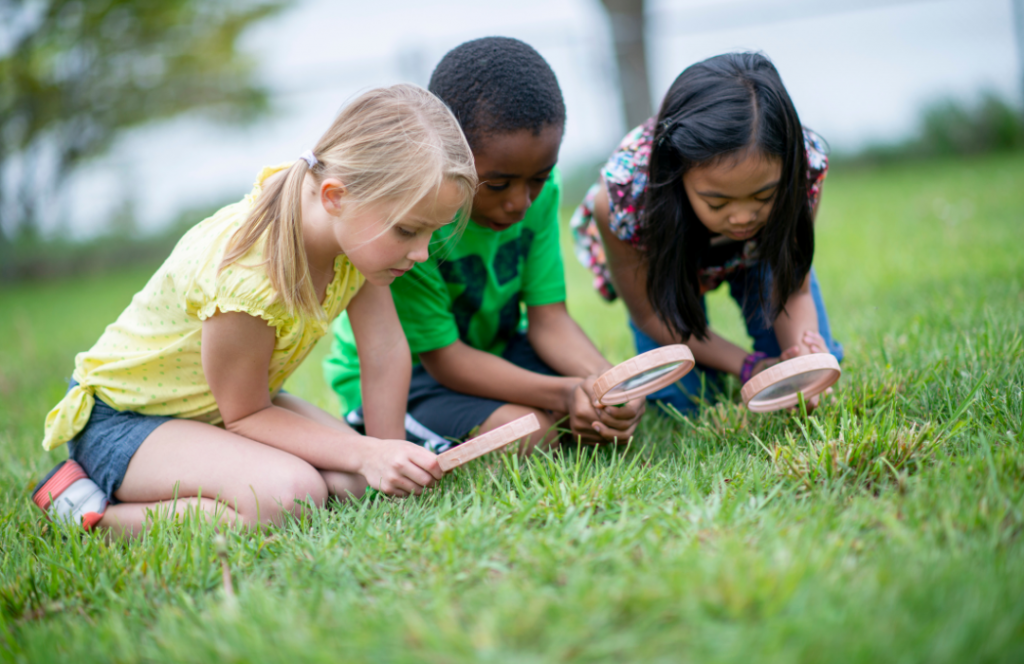What Do they Learn?
1. Observational Skills:
Through outdoor activities and nature walks, preschoolers enhance their observational skills. They learn to pay attention to details, notice changes in the environment, and observe the characteristics of plants, trees, insects, birds, and weather patterns.
2. Scientific Inquiry:
Engaging with nature encourages curiosity and sparks scientific inquiry in young children. They begin to ask questions about the world around them, such as why leaves change color, how birds build nests, or what causes rain.
3. Nature Connection:
Regular exposure to nature fosters a deep connection with the natural world. Preschoolers develop an appreciation for the environment, learn to respect and care for living things, and understand their role in preserving nature.
4. Physical Development:
Outdoor activities contribute to physical development. Nature walks involve walking, climbing, balancing, and exploring different terrains, promoting gross motor skills and overall physical health.
5. Cognitive Development:
Nature exploration stimulates cognitive development. Children learn to categorize, sort, and compare objects found in nature, enhancing their classification and categorization skills.
6. Language and Vocabulary:
Engaging in discussions about observations and discoveries during nature walks enhances language development. Preschoolers learn new vocabulary related to nature, describing what they see, hear, smell, and touch.
7. Social Skills and Teamwork:
Nature exploration in groups or with peers encourages social interactions and teamwork. Children share discoveries, collaborate in collecting items, and engage in cooperative play, fostering social skills and communication.
8. Sensory Exploration:
Nature provides a rich sensory experience. Children explore different textures, colors, smells, and sounds in the natural environment, stimulating their senses and supporting sensory development.
9. Emotional Well-being:
Spending time in nature promotes emotional well-being. It offers a sense of calmness, reduces stress, and allows children to experience joy and wonder, contributing to their overall happiness.
10. Environmental Awareness:
Early exposure to nature builds a foundation for environmental awareness and conservation. Preschoolers learn about ecosystems, the interdependence of living organisms, and the importance of protecting the environment.

Early exposure to nature builds a foundation for environmental awareness and conservation. Preschoolers learn about ecosystems, the interdependence of living organisms, and the importance of protecting the environment.
5 Ways Parents Can Help their Child Explore Nature
- Nature Walks and Hikes: Take leisurely walks or short hikes in nearby parks, nature reserves, or trails. Encourage your child to observe and interact with nature—point out different plants, trees, insects, and wildlife. Discuss what you see, hear, and smell.
- Backyard Adventures: Explore nature in your own backyard. Set up a small area for birdwatching with a bird feeder, or create a mini garden where children can plant and care for flowers or vegetables. Encourage them to observe the insects, birds, or other wildlife that visit your yard.
- Nature Scavenger Hunts: Organize a nature-themed scavenger hunt. Create a list of items for your child to find in nature, such as specific leaves, rocks, flowers, or animal tracks. This activity encourages observation and exploration.
- Exploration Through Play: Incorporate play-based nature exploration. Build forts using sticks and leaves, create nature-inspired art with collected items like pinecones or feathers, or set up a mud kitchen for sensory play using natural materials.
- Outdoor Learning Activities: Engage in educational activities outdoors. Bring books, magnifying glasses, or binoculars to facilitate observation and exploration. Encourage your child to journal or draw what they see, fostering creativity and documentation skills.


